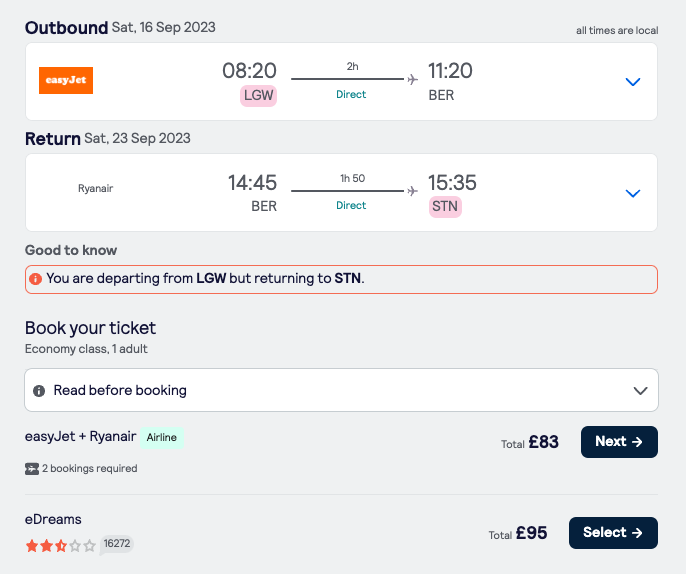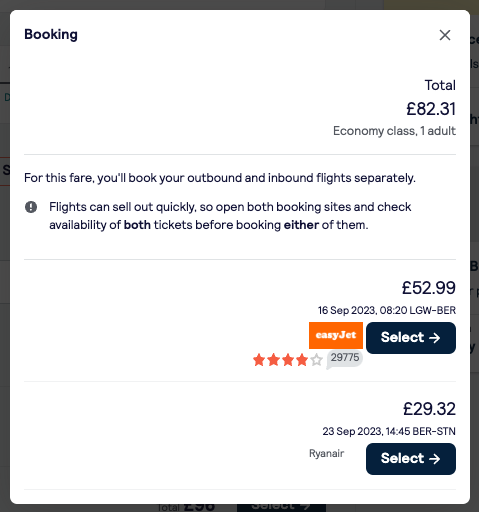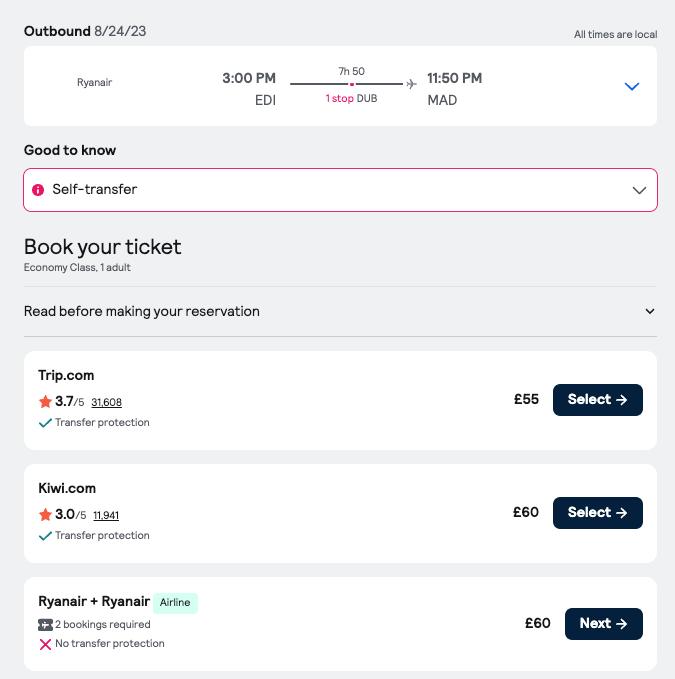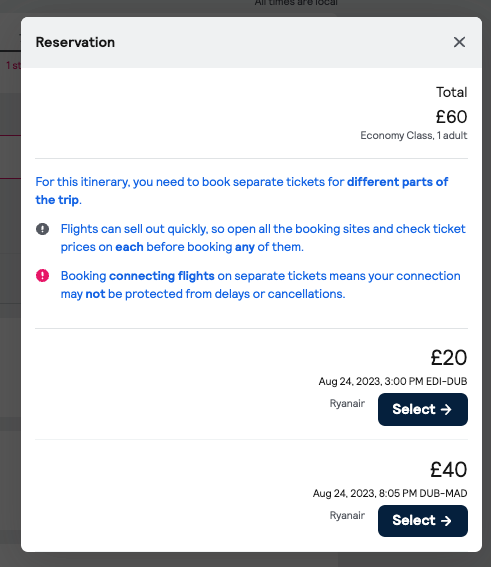Mash-ups
What are Mash-ups?
Mash-ups are a Skyscanner virtual interline product. This is where Skyscanner creates additional itinerary options for travellers by connecting flight segments from partners who do not have an interline/codeshare agreement in place.
These are routes where a user can fly with different airlines, because it can be cheaper than booking with just one.
There are two types of mash-up:
- Sum-of-one-way (SOOW):
- If a user wanted to fly London to New York, they might find it’s cheaper to fly out with British Airways and back with Virgin Atlantic, rather than buy a return ticket with one airline
- In this example, the traveller needs to make 2 bookings, one with British Airways and one with Virgin Atlantic
- Non-protected self transfer (NPST):
- If a user wanted to fly London to Sydney, they might find it’s cheaper to fly London to Dubai with Emirates, and then Dubai to Sydney with Qantas, rather than booking the whole route with one airline
- In this example, the traveller needs to make 2 bookings, one with Emirates and one with Quantas
- Here, the traveller must also collect their hold baggage in Duabi and check in again for their second flight with Quantas, the stop over is not protected
Important things to know about Mash-ups:
- The user is required to make more than 1 booking and will receive more than 1 booking reference
- Mash-ups DO NOT involve an airline alliance. So if something goes wrong with a mash-up, it could cost a user more money
Are Mash-ups better than other tickets?
It depends. Skyscanner will offer mash-ups if they’re cheaper, or if they increase itinerary coverage by enabling an itinerary that otherwise would not exist. However, like we also said, mash-ups can carry some risks which you should make your users aware of.
Let’s say a user booked that single from London to New York with British Airways, and then that single from New York to London with Virgin Atlantic. It’s unlikely, but if British Airways suddenly called a strike, a user would have to think carefully about what to do next. British Airways would compensate for the flight out; however, Virgin Atlantic would not need to compensate the user for the flight back
Now, let’s say the strike was only a couple of days, and British Airways could fly a user out after that. They would have to decide whether to just have a shorter trip, or whether to change their Virgin Atlantic flight. If they change your Virgin Atlantic flight, they’ll charge you — after all, the British Airways strike wasn’t their fault.
How to identify a Mash-up
You can learn more about how to identify different Booking Types, including mash-ups, here.
Best Practices for implementing a Mash-up
You must make your users aware of the risks associated with mash-ups:
- You must provide booking links for each segment (NPST) or each leg (SOOW) of the journey for a user so the user can redirect and book with each agent
- All mash-ups should be marked with a message explaining to the user that multiple bookings are required
- Ask your users to open all the different parts of the journey BEFORE booking the first flight to double check there's still availability. Flights can sell out quickly and we want to make sure a user can complete their trip
- Make users aware of the lack of protection/cover if something goes wrong and the self transfer (for NPST only)
| Mash-up | Example | |
|---|---|---|
| Sum of one way |  |  |
| Non Protected Self Transfer |  |  |
How we implement Mash-ups on Skyscanner
While we are happy to share examples of how we implement mash-ups, please note that we regularly update our UI in line with our own learnings and traveller needs, which are often unique to Skyscanner.
If I show a user a Mash-up, they book it, and it goes wrong, does Skyscanner give money back?
We really want all users to have a great travel experience. That’s the whole reason we’re here! We use our top-notch tech skills to analyse hundreds of flights and prices so we can show you good options for flights.
We provide this service for free BUT we don’t hold the users booking and we cannot refund a user if something goes wrong. That's taken by the airline or travel agent they select so they are the best people to help if they have any specific questions.
What we insist is that you give your users all the information you can upfront, so they can think carefully about the risks before booking.
Can I filter out Mash-ups?
You may not want to offer this feature to your uses. To filter out mash-ups, you can filter out results so that agentIds.length === 1.
Please note, if you choose to filter out mash-up itineraries this will impact:
- Filtering & Sorting functionality: score value for criteria will still consider mash-up itineraries
- Stats: the information returned for minPrice, minDuration etc will still include mass-up itineraries